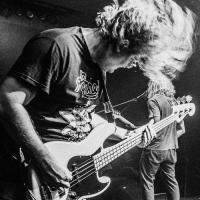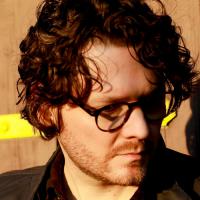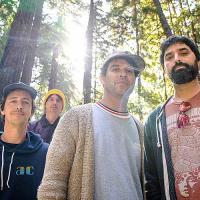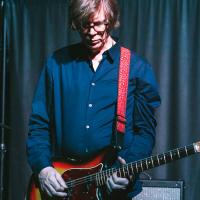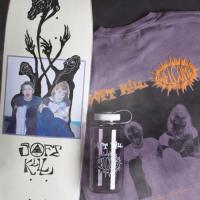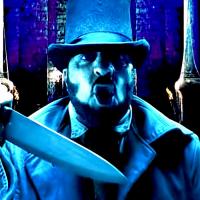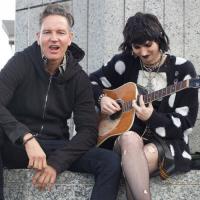Tommy Guerrero

"It will always be a magnet for the fucked up and estranged."
Interview by Clayton Blaha | Photo by Whiteley
Skateboarding’s fickle demographic has cast many a pioneer to the wayside, leaving them with no other choice than to grasp at straws in the form of Wal-Mart advertisements. Some see it coming and are able to avoid such post-professional pitfalls. Witnessing firsthand the commercialization of skateboarding in the mid-’80s, Tommy Guerrero established Real skateboards with Jim Thiebaud. Since then, Tommy has overseen the growth of a self-sufficient San Francisco skate community under the Deluxe umbrella, all the while recording solo and as a member of Jet Black Crayon. In this era of increasingly devalued skateboarding, it’s rare that a professional is able to extend their legacy through other avenues outside of the industry, to reinvent oneself and find relevance in other arenas. It can be done, though. Tommy Guerrero’s take on funky, Latin-tinged instrumental rock mirrors his approach to skateboarding, and life in general. It’s simple, timeless, and distinctly his own.
So you’ve been busy recently. Tell me what you’ve been up to.
Gleaming the cube, stuff like that. Just working at Deluxe and moonlighting as a musician. I’m watching my son get goofier by the day, and I love it!
What do you think was the best album of 2007 and why?
I probably have three albums from last year, but I’d have to say Jose Gonzales’ record, or The Budos Band II. They’re both raw and honest, moving, and simply powerful. Never mistake simplicity as weakness.
How has skating had an effect on your musical taste over the last three decades?
Man, skating has informed and shaped me completely! Late ’70s punk and skating changed everything for me. DIY, that’s how this solo music making came to be. It’s not about taste, but being open or receptive to different ideas and approaches.
What new music are you listening to?
I’m not sure anything is really “new.” I’ve been going back to some early ’80s stuff. Artists I would have never listened to then, Style Council being the latest. I’ve always been a fan of Joy Division/New Order and The Cure. There were so many bands, especially English, that were into soul and creating their own soul hybrid. I’m really interested in that right now. I know very little, so maybe someone can hip me to some good stuff. Email me at my website.
As a native San Franciscan, how do you feel The City as a whole has changed since you were born in 1966?
Completely, that’s how! The one aspect that will never be uprooted is the urge to create. SF is seriously fertile ground for expression. It’s in the mud and asphalt. It will always be a magnet for the fucked up and estranged.
How has it changed in regards to skating?
Getting kicked out of everywhere is new, but I guess we were as well to some degree. It’s bizarre that the skateparks are actually happening. I just hope they don’t come down on street skating even more, since there will be two parks here. Crocker-Amazon is completely fucked, but people rip it! Once, I slammed into a little kid in the deep end that was standing there holding his Razor scooter. I jacked my knee pretty good and haven’t skated there since. I just hope the new park turns out proper.
Any good stories about The Dish?
Shit, just the standard bottle-toss, chase-out scenario. I always got away unscathed.
Who would be in your top five historical, dead-or-alive San Franciscans?
Wow, I guess I never thought about it. These are just the standard types, in no particular order: Herb Caen, George Moscone and Harvey Milk, Sly Stone, Dirk Dirksen, and Jello Biafra.
Tell us about your relationship with Fausto.
I met him when I was about nine at a bike shop in the Avenues, when he was making Stroker trucks. Later he came to the schoolyard where we skated, Jefferson, which is still being skated today, and set up cones. He had several people test the trucks, and I think he gave my brother a set. This was the pre-skatepark era in NorCal. Then when the parks opened, I’d see him every now and then. He’d have riders like the Buck brothers, Kiwi, and Blackhart testing what would become the venerable Independent truck. I don’t remember when he gave me my first set, but I know I’ve been riding them since day one. Thirty years. I think my relationship with him was similar to most people’s: an ebb and flow of hot and cold, but always one of respect, too. You may not agree with each other, but both parties walked away opinions intact. He admired those who stood their ground and spoke their mind. I think that was the one aspect of our relationship that never wavered, because I would tell it like it is. Whether he wanted to hear it or not, he appreciated the candor. I hope he knew how much I respected him. I miss his fire now.
Who wrote and performed the song for your part in Future Primitive?
I’m not sure, probably one of Stacy’s friends. That was such a corny blues tune. Maybe Johnny Rad?
You have a distinct Latin vibe to a lot of your solo material. How does your heritage influence your songwriting?
It doesn’t. I grew up with my mother and her side of the family. The brown comes from my father’s side, Chilean, Filipino, and Ohlone. The rest of the Guerrero clan basically ostracized us. My mom gave him the boot when I was a few months old, and I guess they didn’t think he deserved it. I don’t know; I’m speculating. I know he still needs a kick in the ass, though! Anyway, I’m not sure how the infusion of that style came about; I just tend to gravitate to the rhythm. Maybe it’s San Francisco and all the Chicano rock still lingering since the ’60s and ’70s. I’m just channeling, perhaps.
How did Jet Black Crayon form?
Out of necessity. I was asked to go on tour with Isotope 217 and knew that my “brand” of rock and roll wouldn’t really fit the bill, so I got a couple friends together, Monte Vallier and Gadget, and we decided to form a project to make this tour happen. We’d all worked together in the past and had been friends since the days of yore, so it was a natural gathering of San Fransickos. Most of the music was based on my bass ditties. I’ve always been planning to make an all-bass record, and I still am, so I had ideas in the grey matter ready to go. Now our sights are more set on film scores and the likes. We’re not really a live act. We don’t have time to practice with one another, so it’s more of a creative outlet for all.
What is the most rewarding part of making records and touring? Mad skrill, hot chicks, hella blow, hookers, guns, blood transfusions, pick sponsors, hookers and—wait, did I say hookers?
The creative aspect is a necessity to keep from going completely mad, hence the records. I’ll listen after a long period has passed and wonder, “How the hell did this happen, and how am I going to do it again?” It’s almost like I was removed from the process. It’s a difficult fate. I don’t tour much, but when I do it’s usually in Japan. They treat you like a damned king! It’s the best. That said, the horrors of the road as a band don’t really exist for me. They did as a skater, though, so in most ways I’ve already lived that dream/nightmare. I love being on the road, but it gets tough, as we all know. Playing live can transcend everyone involved if you can free yourself of the daily bullshit, just let it happen, and not think about the present. Close your eyes and let the world slip away. It also helps to practice a bit. Many thanks to all those who have supported me in the past and continue to do so in the present! Salute.
Download Tommy Guerrero songs or albums from the iTunes store here or check his myspace for updates.
-
12/22/2024
Skegss Interview
Australia's Skegss are the reverb drenched summer soundtrack you need. Read the exclusive Thrasher interview. -
12/22/2024
Beirut Interview
The music of Beirut has been featured in many skate vids over the years, most notably in Mark Suciu’s “Verso” masterpiece. Mark caught up with Zach Condon, the man behind the band, in this exclusive interview. -
12/22/2024
Tom DeLonge Interview
Angels & Airwaves was born out of Tom DeLonge leaving Blink-182. Here he talks about charting that band’s own path along with his thoughts on skating and UFOs. -
12/22/2024
Greta Van Fleet Interview
Using musical chemistry, the band members of Greta Van Fleet extract the essence of various classic rock anthems. They combine the parts they like and create a sound all their own. These guys truly rock and roll. -
12/22/2024
Mononeon Interview
The term "musical prodigy" doesn't quite capture the bass-playing abilities of Mononeon. It's more accurate to say he's one of the best to ever pick up the instrument. See for yourself. -
12/22/2024
Animal Collective Interview
Animal Collective blew up in the skate world when their song was used in Jake Johnson's Mind Field part—which is regarded as a masterpiece of skating/editing/music. The band's unique legacy and sound has only gotten stronger in the following years. -
12/22/2024
Thurston Moore's Interview
Thurston is a founding member of Sonic Youth and a guitar virtuoso. His various projects have created a rich musical legacy. He also has deep roots with skating and video-making. Here he describes the mutual affection between skating and his music. -
12/22/2024
Soft Kill x Welcome Skateboards
Welcome gets the singer from Soft Kill on the line to discuss music, addiction and their recent collaboration. -
12/22/2024
R.A. the Rugged Man Interview
During his 30-year career, R.A. has occupied both the spotlight and the status of an underground hip-hop legend. His song "Uncommon Valor" is regarded as a lyrcial masterpiece and he shows no signs of stopping. -
12/22/2024
Third Eye Blind Interview
After millions of album sales since the mid-90s, Third Eye Blind frontman Stephan Jenkins continues to make music without compromise or concern about radio hits and pop charts. He features Cher Strauberry in his newest video and she sat with him for an interview.
